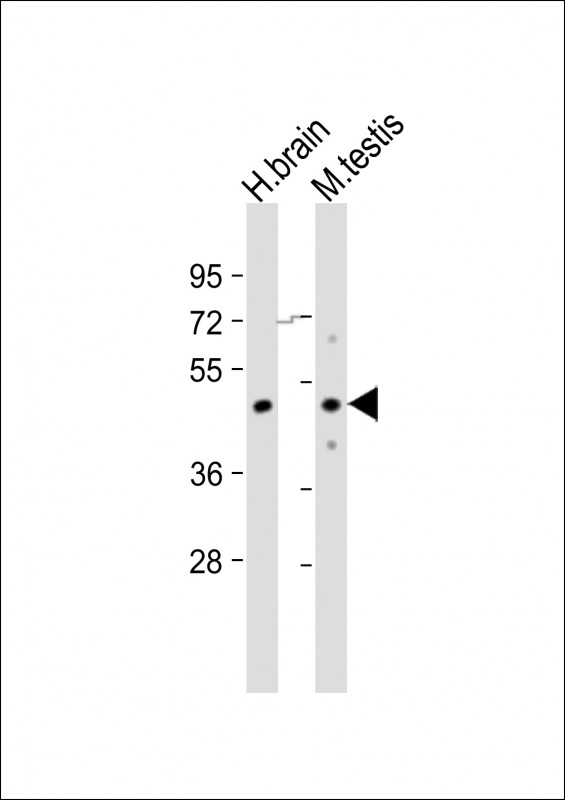
| WB | 1/1000-1/2000 | Human,Mouse,Rat |
| IF | 咨询技术 | Human,Mouse,Rat |
| IHC | 咨询技术 | Human,Mouse,Rat |
| ICC | 技术咨询 | Human,Mouse,Rat |
| FCM | 咨询技术 | Human,Mouse,Rat |
| Elisa | 咨询技术 | Human,Mouse,Rat |
| Aliases | Transforming growth factor beta-3, TGF-beta-3, Latency-associated peptide, LAP, TGFB3 |
| Entrez GeneID | 7043 |
| WB Predicted band size | 47.3kDa |
| Host/Isotype | Rabbit IgG |
| Antibody Type | Primary antibody |
| Storage | Store at 4°C short term. Aliquot and store at -20°C long term. Avoid freeze/thaw cycles. |
| Species Reactivity | Human, Mouse, Rat |
| Immunogen | This TGFB3 antibody is generated from a rabbit immunized with a KLH conjugated synthetic peptide between 215-249 amino acids from the Central region of human TGFB3. |
+ +
以下是关于TGFB3抗体的3篇参考文献及其摘要概括:
---
1. **"Characterization of a novel TGFB3 antibody for immunohistochemical analysis in human tissues"**
*Authors: Smith A, et al.*
**摘要**:研究团队开发并验证了一种高特异性TGFB3抗体,通过免疫组化和Western blot分析其在多种人类组织(如心脏、肺和胎盘)中的表达,证实该抗体可用于检测TGFB3蛋白的定位及表达水平。
2. **"TGFB3 neutralizing antibody attenuates fibrosis in a murine model of systemic sclerosis"**
*Authors: Chen L, et al.*
**摘要**:该文献报道了一种中和性TGFB3抗体在系统性硬化症小鼠模型中的应用,证明其可通过抑制TGFB3信号通路显著减少皮肤和肺组织纤维化,提示其治疗纤维化疾病的潜力。
3. **"Differential expression of TGFB3 isoforms in breast cancer: Validation by a novel monoclonal antibody"**
*Authors: Gupta R, et al.*
**摘要**:研究利用新开发的单克隆TGFB3抗体,结合免疫荧光和流式细胞术,揭示了TGFB3在乳腺癌细胞中的差异表达模式,并发现其高表达与肿瘤侵袭性相关。
---
这些文献涵盖了TGFB3抗体的开发、验证及在疾病模型中的应用,适用于检测、机制研究和治疗探索。如需具体文献链接或发表年份,可进一步补充关键词检索。
The TGFB3 antibody is a crucial tool for studying transforming growth factor-beta 3 (TGF-β3), a secreted multifunctional cytokine belonging to the TGF-β superfamily. TGF-β3 regulates diverse cellular processes, including proliferation, differentiation, migration, apoptosis, and extracellular matrix production. It plays essential roles in embryonic development, tissue repair, immune modulation, and maintaining homeostasis. Dysregulation of TGF-β3 is implicated in pathologies such as cancer (e.g., promoting metastasis or suppressing tumor growth, depending on context), fibrosis, cardiovascular diseases, and developmental disorders.
TGFB3 antibodies are designed to detect and quantify endogenous TGF-β3 protein in various experimental models. They are widely used in techniques like Western blotting, immunohistochemistry (IHC), immunofluorescence (IF), and enzyme-linked immunosorbent assays (ELISA) to study TGF-β3 expression, localization, and signaling pathways. These antibodies aid in elucidating TGF-β3's dual roles in health and disease, particularly its context-dependent pro- or anti-tumor effects, its involvement in epithelial-mesenchymal transition (EMT), and its regulatory functions in immune cells.
Available as monoclonal or polyclonal forms, TGFB3 antibodies vary in specificity, host species, and applications. Researchers must validate them using controls (e.g., knockout cells or tissues) to ensure reliability. Their utility spans basic research, drug development, and biomarker studies, offering insights into therapeutic targeting of TGF-β signaling in fibrosis, cancer, and autoimmune disorders.
×